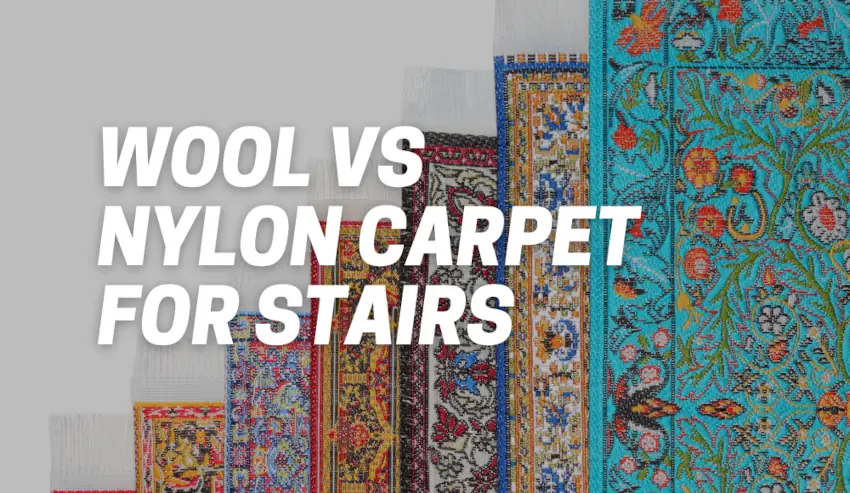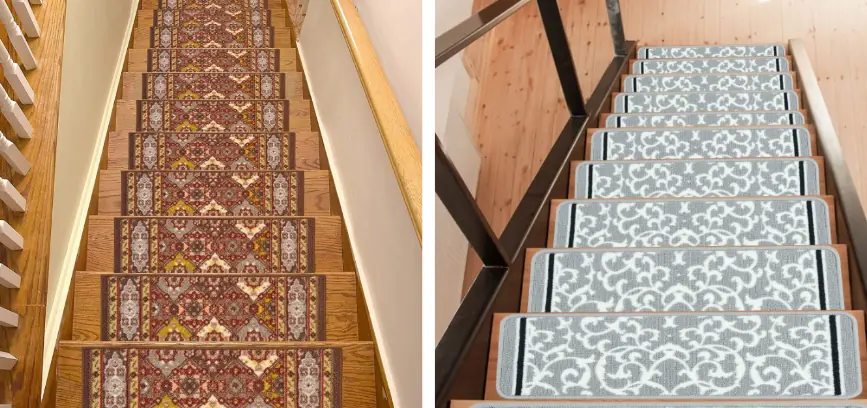When it comes to choosing the right carpet for your stairs, there are several factors to consider. Stairs are high-traffic areas that require a durable and reliable carpeting solution. In this article, we will explore the key differences between wool vs nylon carpet for stairs.
By understanding the pros and cons of each material, you’ll be better equipped to make an informed decision for your home.
Which Type of Carpet is Best for Stairs?
Selecting the best carpet for stairs involves considering factors such as durability, maintenance, and overall performance.
While there are various options available, wool and nylon carpets are two popular choices worth exploring.
Is Wool a Good Choice for Stairs?
Wool carpeting has been a favorite among homeowners for its natural beauty and luxurious feel.
Wool carpet for stairs offers several advantages.
- Firstly, wool is known for its exceptional durability, making it well-suited for high-traffic areas like stairs.
- Additionally, wool fibers have a natural crimp that provides bounce and resilience, helping the carpet retain its shape even with frequent use.
Moreover, wool is a highly flame-resistant material, making it a safer option for stairs in case of accidents.
The natural insulation properties of wool also contribute to a quieter and more comfortable stairway, reducing noise levels and providing added warmth.
Is Wool Carpet Better Than Nylon?
While wool is a popular choice, nylon carpets also have their merits.
Nylon is a synthetic material that has gained recognition for its exceptional strength and resilience. In terms of durability, nylon carpets often outperform wool, especially in high-traffic areas like stairs.
Nylon fibers are highly resistant to abrasion and crushing, making them ideal for stairs that experience heavy foot traffic.
Additionally, nylon is more resistant to stains and fading, making it easier to maintain and clean.
This makes nylon a practical choice for families with young children or pets, as it can withstand spills and accidents more effectively than wool.
Is wool carpeting good for stairs at all?
Stairs are one of the most heavily trafficked areas in any household; therefore, they require durable material that can withstand constant use without showing signs of wear or tear quickly.
This is where wool carpet comes in handy because it has high tensile strength, which means it can hold up well under pressure without losing its shape or piling.
Wool carpets are also naturally resistant to dirt, dust mites, mold growth, and odor-causing bacteria when properly maintained with regular cleaning schedules such as vacuuming or professional cleaning services.
These features make them ideal in homes where there are children who often spill things on carpets or adults with allergies.
Does wool carpet last longer than nylon?
Wool carpet is known for its exceptional durability, and it is often regarded as a long-lasting flooring option.
However, when comparing the lifespan of wool carpet to nylon carpet, it’s important to consider various factors that can affect durability and longevity.
In general, nylon carpet tends to have a slightly longer lifespan than wool carpet.
Nylon fibers are highly resilient and resistant to abrasion and crushing, making them well-suited for high-traffic areas like stairs. Nylon carpets can withstand heavy foot traffic and maintain their appearance and performance over an extended period.
On the other hand, while wool carpet may not be as inherently resilient as nylon, it still offers good durability. Wool fibers have a natural crimp that helps them bounce back and maintain their shape, even with frequent use. With proper care and maintenance, wool carpet can last for many years and continue to look beautiful.
What are the Downsides of Wool Carpet?
While wool carpets have numerous advantages, they do come with some downsides.
One major consideration is their susceptibility to staining and moisture absorption. Wool fibers can absorb liquid spills, leading to stains that may be difficult to remove. It is crucial to treat spills promptly and use appropriate cleaning methods to minimize potential damage.
Another aspect to consider is the cost. Wool carpets tend to be more expensive than their nylon counterparts. The higher price tag reflects the natural quality of wool and the labor-intensive manufacturing processes involved.
If budget is a significant concern, nylon carpets offer a more affordable alternative without compromising on durability.
Synthetic Nylon Carpet for Stairs: Pros and Cons
Pros of Synthetic Nylon Carpet
- Durability: Nylon carpets are renowned for their exceptional durability and resilience, making them an excellent choice for stairs.
- Stain Resistance: Nylon fibers have a natural resistance to stains, making it easier to clean up spills and maintain the carpet’s appearance.
- Color Retention: Nylon carpets are more resistant to fading and retain their vibrant colors for longer periods, even in direct sunlight.
Cons of Synthetic Nylon Carpet
- Potential Static Buildup: Nylon fibers have the tendency to generate static electricity. However, this can be minimized by incorporating antistatic treatments during the manufacturing process.
- Less Natural Look and Feel: While nylon carpets offer durability, they may lack the natural look and feel of wool. This can be subjective, as some homeowners prefer the luxurious texture of wool.
- Vulnerability to Heat: Nylon carpets can be more susceptible to heat damage, so caution should be exercised when using hot objects or dragging heavy furniture across the carpet.
Wool Carpet vs Nylon Price
One significant factor that affects the choice between wool and nylon carpets is the price.
As mentioned earlier, wool carpets tend to be more expensive than nylon carpets. The premium cost of wool carpets is due to the natural quality of the material and the intricate manufacturing processes involved. On the other hand, nylon carpets offer a more budget-friendly option without compromising on durability.
How much more expensive is wool carpet than nylon?
On average, wool carpet can cost two to three times more than nylon carpet. This higher price is primarily due to the natural quality of wool fibers and the labor-intensive manufacturing processes involved in producing wool carpets. Wool is a premium material known for its luxurious texture, durability, and natural flame resistance, which contributes to its higher cost.
Useful Tips for Choosing Carpet for Stairs
- Consider Traffic Levels: Stairs experience heavy foot traffic, so prioritize a carpet that can withstand wear and tear.
- Opt for Low Pile Carpets: Low pile carpets are easier to clean and maintain, making them a practical choice for stairs.
- Choose a Neutral Color: Neutral-colored carpets tend to be more forgiving when it comes to hiding stains or wear over time.
- Consult a Professional: Seek advice from carpet professionals who can guide you on the best carpet type and installation for your specific needs.
Factors to Consider When Choosing Wool or Nylon Carpet for Stairs
So, what is better carpet wool or nylon?
Well, there is no straight answer, and is a matter of preference.
Budget: How Much Are You Willing to Spend?
One of the most important factors to consider when deciding between wool and nylon carpet for stairs is budget.
Wool is generally more expensive than nylon, due to its natural properties and higher manufacturing costs. Nylon, on the other hand, is a synthetic fiber that can be produced at a lower cost.
If you have a tight budget, then nylon carpet might be the better option for you. However, if budget isn’t as much of a concern, then wool may be worth splurging on due to its durability and insulation properties.
Durability Needs: How Much Traffic Will Your Stairs See?
Another crucial factor to consider is how much traffic your stairs will see.
If your stairs are high-traffic areas that are used frequently throughout the day, then you’ll want a durable carpet that won’t wear down easily over time. In this case, both wool and nylon carpets can be good options.
However, if your stairs don’t see as much traffic or use, then nylon carpet may actually be too durable and unnecessary for your needs. In this case, wool might make more sense due to its natural insulation properties and softer feel underfoot.
Style Preferences: What Look Do You Want?
Style preferences are also an important consideration when choosing between wool and nylon carpets for stairs.
Wool carpets often have a more luxurious look and feel due to their natural fibers. They can come in a variety of styles from traditional patterns to modern designs.
Nylon carpets offer more color options than wool carpets because they can be easily dyed during manufacturing. They also tend to have a more uniform appearance with fewer texture variations compared with wool carpets.
Allergies or Sensitivities: Are You Allergic to Wool?
If you have any allergies or sensitivities to certain materials, then it’s important to consider this when choosing between wool and nylon carpets for stairs.
Wool can be a great option for those who are looking for a natural, non-toxic material. However, if you are allergic to wool or have sensitive skin, then nylon may be the better option.
Nylon carpets are also less likely to collect dust and allergens compared with wool carpets. They are easier to clean and maintain, making them a good choice for those with allergies or asthma.
FAQs
What is the best carpet for stairs with high traffic?
Both wool and nylon carpets can be suitable options for stairs with high traffic. While wool offers natural durability and flame resistance, nylon excels in terms of abrasion resistance and stain resistance.
Where can I buy carpet for stairs?
Carpet for stairs is available at various home improvement stores, carpet specialty shops, and online retailers. It’s recommended to visit a physical store to see and feel the carpet options before making a purchase.
Is wool carpet high maintenance?
Wool carpet requires regular maintenance to preserve its appearance and longevity. It is important to promptly address spills and stains, vacuum regularly, and schedule professional cleaning periodically to keep the carpet in top condition.
How do you clean wool carpet on stairs?
Cleaning wool carpet on stairs requires a gentle approach. Start by blotting up any spills with a clean cloth or paper towel.
Avoid rubbing the stain, as it can push the liquid deeper into the fibers. For general cleaning, vacuum the carpet regularly using a suction-only vacuum or a vacuum with adjustable brush height to prevent excessive agitation.
Conclusion
Choosing the right carpet for stairs is essential to ensure both functionality and aesthetics. Wool and nylon carpets offer distinct advantages and drawbacks, catering to different preferences and requirements.
Consider the durability, maintenance, and budgetary factors when making your decision. By understanding the differences between wool and nylon carpets, you’ll be able to select the perfect option for your staircase that combines both style and practicality.





